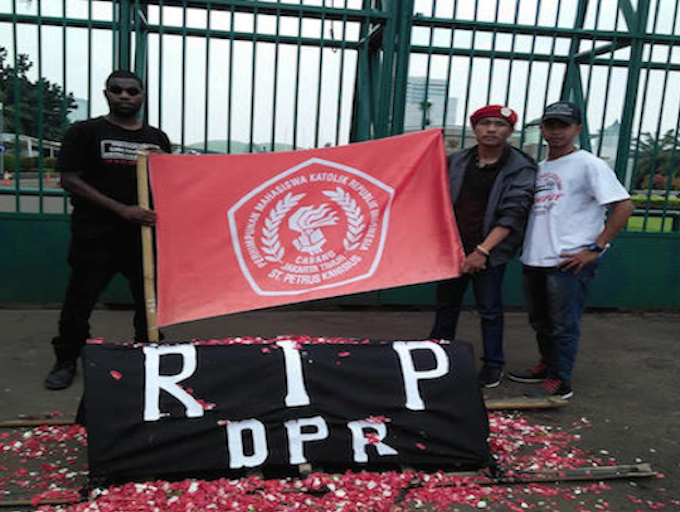
By Ryan Dagur
JAKARTA (Asia Pacific Report/UCA News/Pacific Media Watch): A wave of protests has swept Indonesia in recent days after legislation criminalising criticism of lawmakers took effect last week.
President Joko Widodo has also come under fire for not taking decisive action against the law, labeled by many as a threat to democracy.
The new law follows a string of others in Southeast Asia criminalising criticism of monarchs and legislators — notably in Thailand and Cambodia — further curbing freedom of speech.
READ MORE: RSF condemns 'disrespect' criticism ban over Jakarta Parliament
A number of Indonesian rights groups have filed for a judicial review in the Constitutional Court against the law.
The law says Parliament's Ethics Council can take legal action against individuals, groups or legal entities that "disrespect the dignity" of lawmakers and Parliament as an institution. It also can order police to forcibly summon individuals for questioning.
An online petition at Change.org supported by a coalition of civil society groups, including Indonesia Corruption Watch, the Legislative Monitoring Committee and the Association for Election and Democracy has received significant backing.
Dhenok Pratiwi, campaign manager at Change.org said the petition has collected almost 215,000 signatures over the last four days.
Biggest national petition
"This is the biggest national petition and the fastest supported by the public," she said on Tuesday.
Hendrik Rosdinar, coordinator of the civil society coalition said the law is "a disaster for Indonesian citizens," because "anyone who criticizes parliament will have to prepare for a prison sentence."
A large number of other groups have called for judicial review, including Forum of Law and Constitutional Studies, Indonesian Solidarity Party and students from the University of Indonesia.
Dini Purwono from the Indonesian Solidarity Party's said the law "endangers justice and democracy."
"Parliament members have acted against the constitution and the principle of equality before the law," she told ucanews.com.
Criticism of Widodo
Amid the outcry since Parliament passed the bill on February 13, Widodo has expressed concerns about the legislation.
He also did not sign the law. But the president's hands were largely tied as once a law is passed by Parliament, he does not have the power of veto and, without his signature, it automatically goes into effect after 30 days.
Widodo told reporters on Monday that he would back a judicial review of the law.
However, he has come under fire from rights activists who condemned him for not spotting what the law would entail during the drafting and revision process.
He was also criticised for not introducing legislation correcting a number of controversial articles in the law.
"His is an ambiguous attitude, as he said he did not want to sign it [the law] because of public opposition to it, but at the same time he does not want to find a way out of this," said Donal Fariz, coordinator of Indonesia Corruption Watch.
He said Widodo had thrown that responsibility to society.
"Society has to fix the mistake that has been made by parliament and the government," Fariz said.
House Speaker Bambang Soesatyo said lawmakers would accept the result of a judicial review.
This work is licensed under a Creative Commons Attribution-NonCommercial 3




